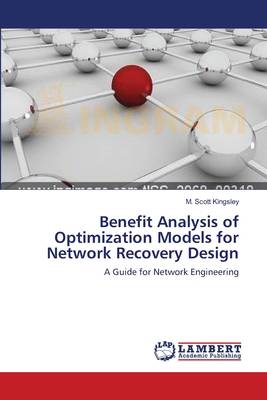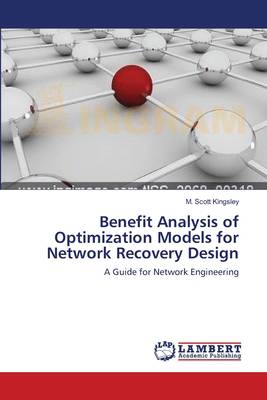
- Afhalen na 1 uur in een winkel met voorraad
- Gratis thuislevering in België vanaf € 30
- Ruim aanbod met 7 miljoen producten
- Afhalen na 1 uur in een winkel met voorraad
- Gratis thuislevering in België vanaf € 30
- Ruim aanbod met 7 miljoen producten
Zoeken
Benefit Analysis of Optimization Models for Network Recovery Design
A Guide for Network Engineering
M Scott Kingsley
Paperback | Engels
€ 70,95
+ 141 punten
Omschrijving
Network recovery is critical capability that service providers must provide. It can be accomplished in four ways. Span, or local, protection is the most common recovery method. Another common method is path restoration which is accomplished end-to-end. Some service providers apply both span protection and path restoration in different parts of their networks in a "hybrid" configuration. Another more recent alternative is a feature in Multiprotocol Label Switching (MPLS) called "Fast Reroute." This praxis addresses several fundamental problems related to each of the above network recovery options in large service provider networks. First, the effects of the numbers of links, demand unit sizes, and link size modularity have on the four recovery methods, individually and collectively, are examined. Next, the selection of the minimum cost recovery method given the presence and levels of the other options is determined. Finally, the cost differences of the recovery methods given any combination of the other options and their levels are presented.
Specificaties
Betrokkenen
- Auteur(s):
- Uitgeverij:
Inhoud
- Aantal bladzijden:
- 172
- Taal:
- Engels
Eigenschappen
- Productcode (EAN):
- 9783659538544
- Verschijningsdatum:
- 3/06/2014
- Uitvoering:
- Paperback
- Formaat:
- Trade paperback (VS)
- Afmetingen:
- 152 mm x 229 mm
- Gewicht:
- 258 g

Alleen bij Standaard Boekhandel
+ 141 punten op je klantenkaart van Standaard Boekhandel
Beoordelingen
We publiceren alleen reviews die voldoen aan de voorwaarden voor reviews. Bekijk onze voorwaarden voor reviews.











